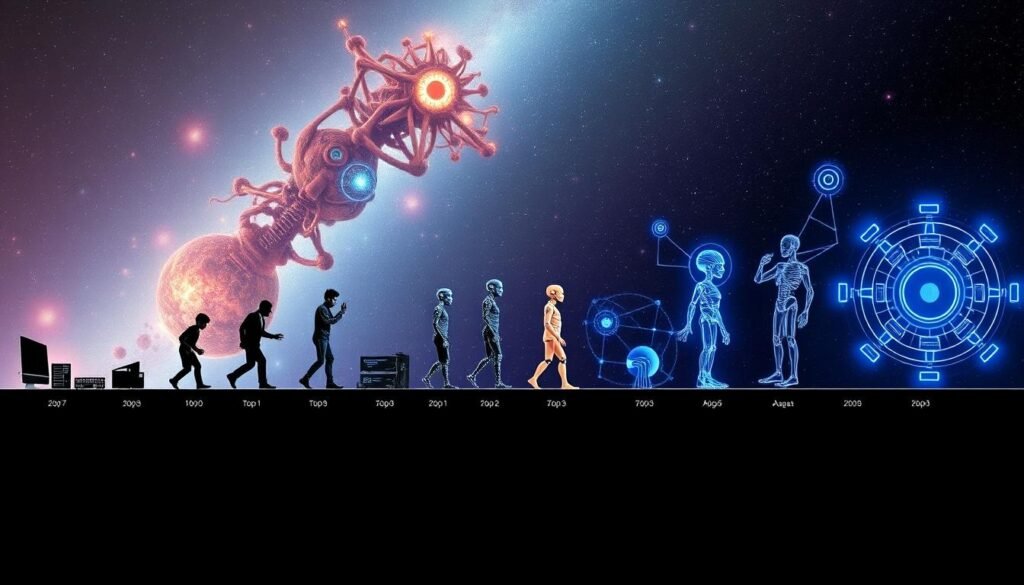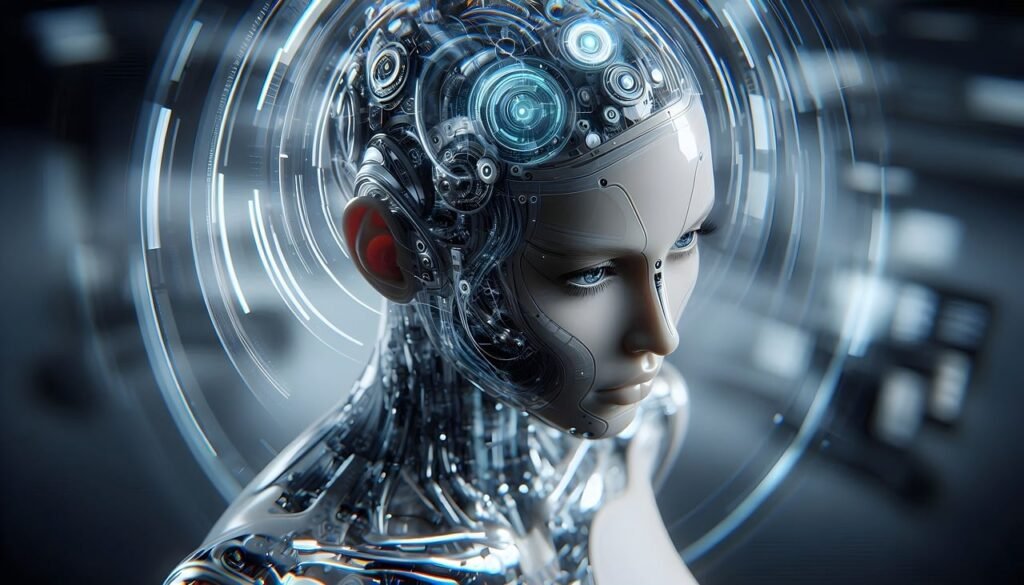Did you know the global AI agent market is set to hit $14.8 billion by 2025? This shows a big move towards smart automation that's hard to ignore1. With 67% of business leaders thinking AI agents will change their fields in three years, it's clear they're key1. AI agents are like smart software that makes things better, more accurate, and adaptable in many areas2.
They make work smoother and more productive. These smart agents are more than a trend; they're a big change in how businesses work and decide.
AI agents work together with automation to solve tough problems and give insights right away. This opens up a lot of possibilities for the future2. In this journey, you'll see how AI agents are changing different areas, saving money, and helping companies work better than ever. Let's dive into the world of AI agents and their big role in smart automation's future.
Key Takeaways
- • The global AI agent market is expected to reach $14.8 billion by 2025.
- • 67% of business leaders believe AI agents will notably transform their industries within three years.
- • AI agents are designed to enhance efficiency, accuracy, and adaptability in processes.
- • Agentic AI systems can autonomously handle complex tasks without explicit programming.
- • Combining AI with automation technologies leads to intelligent automation, which performs tasks without human intervention.
- • The integration of AI agents signals a move toward end-to-end automation in business processes.
Introduction to AI Agents and Their Importance
AI agents are a big step forward in intelligent systems, changing how businesses work. They do tasks fast and well, often better than people3. They help save money by doing routine tasks, which is great for companies3.
As companies want to work better, they use AI agents more. These agents help make decisions and improve how things run.
AI agents also make things personal for customers, which is key in today's market3. They can grow with demand, which is important for businesses3. They work all the time, so customers can always get help, making them happier3.
In fields like finance, healthcare, and transport, AI agents are crucial. For example, in healthcare, they help with diagnosis and treatment plans3. They use big language models to understand what users say, making interactions better4.
AI agents make businesses better by using new tech and making things easier for users. They help companies stay ahead in a fast-changing world. They shape how we use technology every day.
| Benefit of AI Agents | Description |
|---|---|
| Efficiency | Perform tasks with speed and accuracy, surpassing human capabilities. |
| Personalization | Utilize data analytics for tailored customer solutions. |
| Scalability | Adapt operations to meet demand surges with ease. |
| Continuous Service | Operate 24/7, providing constant availability for customer interaction. |
| Cost Reduction | Automate routine tasks, reducing labor costs significantly. |
| Industry Applications | Enhance operations across finance, healthcare, and transportation sectors. |
Evolution of Agentic AI
The world of AI has changed a lot, especially with agentic AI. It moves beyond old machine learning and robotic automation. Now, it aims to make systems that can do things on their own.
At first, robotic automation was about making tasks easier for humans. It cut down on mistakes and saved money5. Companies in finance, healthcare, and retail saw big improvements in efficiency5.
Agentic AI takes it further by making automation smarter. It uses current data to plan and break down big tasks into smaller ones. These AI agents learn from their experiences and act based on what's happening around them6.
This new AI helps in healthcare and manufacturing. It leads to better medicine, robotic surgeries, and smarter factories6. It also makes work more efficient, giving employees more time for other tasks7.

Conversational AI has also grown from simple chatbots to smart agents. These agents can make choices on their own. Leaders see the big potential in agentic AI for better workflow and less human oversight7.
In the end, agentic AI is a big step towards smarter and more efficient automation. It's changing how we work in many industries.
What are AI Agents?
AI agents are a big step forward in technology. They are software programs that can work on their own and interact with their surroundings. Their ability to do this has made them very popular because they can do things that humans can't.
Definition and Characteristics of AI Agents
AI agents are software programs that can see and act on their own. They use sensors to understand their environment and follow rules or learn from experience. What makes them special is:
- • Autonomy: They can make decisions on their own without needing a human to tell them what to do.
- • Interactivity: They can talk to users and change how they behave as they learn more or when things change.
This makes AI agents different from regular software. They are part of a new era of smart automation. Microsoft has even made a special library for developers to help make AI agents better8.
Autonomy and Interactivity
AI agents are getting better at being on their own and interacting with us. They are used in many areas, like helping with customer service and in healthcare. Over 72% of companies are already using AI, showing how important it is for businesses9.
AI agents from companies like Microsoft are making things better in many fields. They help make customer service more personal and make work more efficient9. They can learn and get better at doing things over and over again. But, we need to make sure they are safe and work well, which means we need to protect our data10.
How do AI Agents Work?
AI agents use advanced technologies to function. Natural language processing is key. It helps them understand and create human-like language, making interactions smooth.
Your chats with customer service bots show this. They use language models to get your questions right and answer them well11.
Natural Language Processing and AI Agents
NLP lets AI agents have real conversations and understand what you mean. This is vital for making responses that meet your emotional and informational needs. It's all about making you happy12.
It also helps them learn from big databases. This lets them give you answers that are more personal. It turns simple chats into something more meaningful.
Enhanced Decision-Making with AI Agents
AI agents can make decisions better than old systems. They learn from past data, getting better over time. This means they can make quick, smart choices on their own13.
This is super important in places like healthcare and finance. They can look at lots of things and make your tech interactions better. This leads to better results for everyone.
Real-World Applications of AI Agents
The applications of AI agents are vast and impactful. They change industries and how businesses work. These agents make things more efficient and better for users in many areas.
Customer Service Chatbots
AI agents are big in customer service chatbots. They help businesses answer customer questions fast and well. For example, using AI chatbots can cut support tickets by 65%14.
This means customers wait less and businesses can focus on harder questions. Chatbots also help with orders, tracking, and suggestions, making customers happier.
Healthcare AI Agents
In healthcare technology, AI agents are making big differences. They can diagnose better than some doctors, like Google's skin cancer AI in 202315. They also manage records, make operations smoother, and create treatment plans for patients.
This leads to better health outcomes and less work for doctors and nurses.
AI Agents in Finance and Transportation
AI agents are changing finance and transportation too. In finance, companies like JP Morgan cut fraud by 70% and saved $200 million a year with AI15. These agents look at risks and help with pricing and recommendations.
In transportation, AI helps with logistics, like DHL's Cubicycle. It uses data to find the best delivery routes15. This shows how AI can make things safer and more efficient.

| Industry | Application | Impact |
|---|---|---|
| Customer Service | Chatbots | 65% reduction in support tickets |
| Healthcare | Diagnostic AI | Higher accuracy than dermatologists |
| Finance | Fraud Detection | 70% reduction in fraud, $200M saved |
| Transportation | Cubicycle Logistics | Optimized routing through data analysis |
Types of AI Agents
Knowing the types of AI agents is key to understanding artificial intelligence. Each type works in its own way, based on its function and ability to learn.
Reactive Agents vs. Learning Agents
Reactive agents, like simple reflex agents, act based on what they see right now. They follow rules and work best in places where everything is clear. But, they can get stuck in loops in places that are not fully visible1617.
Learning agents, however, get better with time. They have parts like a learning part and a critic. This lets them improve and do better over time1618.
Collaborative and Proactive Agents
Collaborative agents work with humans to get things done faster and better. They help people and machines work together well. Proactive agents, on the other hand, start tasks on their own. They do this based on what they think will happen next, making things more efficient.
This shows why picking the right agent is so important. It depends on what you need to do.
| Type of Agent | Characteristics | Environment Suitability | Learning Capability |
|---|---|---|---|
| Simple Reflex Agents | Respond to specific stimuli | Fully observable | No learning |
| Model-Based Reflex Agents | Utilize internal world models | Partially observable | No learning |
| Goal-Based Agents | Plan actions to reach goals | Partially observable | Some learning potential |
| Utility-Based Agents | Make decisions based on preferences | Flexible environments | Some learning potential |
| Learning Agents | Adapt and improve over time | All environments | Extensive learning |
Knowing these differences helps us use AI wisely16.
Impact of AI Agents on Decision-Making
AI agents are changing how companies make decisions. They can look at huge amounts of data, giving insights we couldn't get before. These agents do tasks on their own and get better at making decisions over time.
Enhanced Data Analysis Through AI Agents
AI agents have changed data analysis for the better. They can quickly go through lots of information with great accuracy. This helps businesses find patterns and trends that humans might miss.
This change makes things more efficient and can save money. For example, AI in cloud management has cut costs by over 30% for users19. This shows how big of a role these technologies play in making important choices for companies.
Real-Time Decision Making with AI Agents
Companies using AI agents get quick advice and insights. This lets them quickly respond to new market trends and problems. For instance, AI has cut costs in insurance by 70% to 90%19.
AI agents also help companies make decisions faster. They keep an eye on data and learn from past experiences. This makes it easier for companies to focus on innovation and being different19.
Key Challenges in Implementing AI Agents
Integrating AI agents into your processes can be tricky. Data privacy and security are big concerns. It's vital to protect user data and follow rules to avoid breaches.
Keeping personal info safe is key to earning trust. Sharing data with others can be risky. That's why strong security and good data management are essential to tackle AI challenges20.
Data Privacy and Security Concerns
Using AI agents means dealing with complex security issues. A big problem is making sure AI doesn't make unfair decisions. This can happen if AI learns from biased data.
To fix this, we need diverse data and regular checks for bias. Being open about how AI works helps build trust and meets rules21.
Addressing Bias in AI Systems
Fixing bias in AI is crucial for fair use. We need to clean data, create quality datasets, and support explainable AI. This way, AI is clear and trustworthy.
Switching to AI means always learning and adapting. This helps fight bias in AI decisions22.




